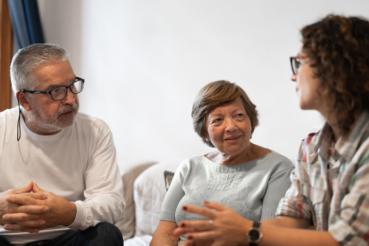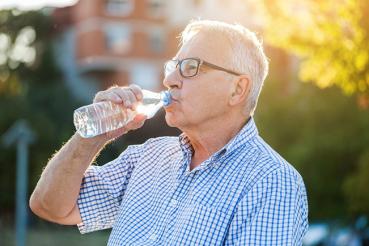For many older women, talking about sex is still downright awkward. But if you want to enjoy a happy, healthy sex life (which has been shown to reduce stress and improve heart health), candid discussions with your partner and doctor are often essential.
Here, an expert offers advice to help older women have a fulfilling sex life after menopause — and explains why it's still important to protect yourself during sex.
The causes of sexual problems in older women
Most of the problems older women have are due to decreased estrogen levels that accompany menopause.
A woman reaches menopause when she has gone through 12 consecutive months without any periods. After that, she's considered postmenopausal. The average age of menopause is 51.
As you near menopause, your ovaries produce less estrogen and other hormones. Doctors call this transitional time perimenopause, and it often starts four to five years before your final period.
The loss of estrogen can make your vaginal walls thinner, drier, less elastic and sometimes inflamed, so you may experience vaginal burning and itching. Sex may be uncomfortable or even painful.
When vaginal tissue is thinner and more fragile, sex can cause tiny tears in the vagina, which makes women more susceptible to sexually transmitted infections. Dwindling estrogen can also decrease the healthy bacteria in your vagina, raising the risk of urinary tract infections.
After menopause — when your ovaries stop secreting estrogen altogether — vaginal problems like these become even more likely.
What to do if sex is painful or uncomfortable
Some women simply stop having sex. But avoiding sexual activity actually has the potential to make matters worse; with sex, the adage "use it or lose it" is especially true.
If sex is painful or uncomfortable, it simply means that some changes might be necessary. Just because these issues are likely to occur doesn't mean they're a normal part of aging, or that you have to tolerate them.
There are effective remedies:
- Vaginal lubricants. Over-the-counter silicone-based products (such as Astroglide and K-Y Jelly) can temporarily ease vaginal dryness and discomfort if you use one before or during sex.
- Vaginal moisturizers. You use these over-the-counter products (such as Moist Again and Replens) every few days to help with dryness, as well as symptoms like burning.
- Prescription low-dose vaginal estrogen. You apply this directly to your vagina, usually as a cream. It can help restore vaginal tissue to its premenopausal state and reverse thinning and dryness, and it may also help prevent urinary tract infections.
These options are very low-risk forms of estrogen therapy, since it is mainly absorbed by your vagina and not your bloodstream — unlike hormone therapy delivered through a pill or patch, which may raise the risk of stroke, breast cancer and blood clots. If you have heart disease, however, talk to your doctor before using topical or vaginal estrogen to make sure it's safe for you.
- Hormone therapy. If you're also having significant hot flashes and night sweats, this may be an appropriate treatment. But doctors typically give it at the lowest dose for the shortest period of time to help minimize the possible health risks.
- Testosterone — yes, that's the male hormone — patches can improve sexual response.
New positions may also be helpful in reducing discomfort brought on by age-related problems, such as osteoarthritis.
It's important to note that more frequent sex promotes vaginal elasticity and lubrication — both of which suffer as women age. So discuss the problems you're experiencing with your partner sooner rather than later and suggest making some changes. Your ob/gyn can also help identify strategies that will work best for you.
Learning to feel comfortable and confident at any age
Instead of wishing for the body you once had, embrace and care for the body you have now.
Yes, you are no longer 30, but isn't that a good thing? While your body has changed over the years, you have so much more to offer in terms of having a healthy and fulfilling relationship.
So exercise at least three times a week for 30 minutes and eat right to combat health problems that can interfere with a good sex life, such as obesity, high blood pressure and diabetes. You'll not only feel healthier but more confident in the bedroom.
And visit your primary health care provider; he or she can put you on the path to healthier — and sexier — living.
More frequent sex promotes vaginal elasticity and lubrication — both of which suffer as women age.
Redefining 'safe sex'
Unfortunately, pregnancy isn't the only issue sexually active women have to worry about.
If you're not in a long-term monogamous relationship, regardless of your age, you must insist that your partners always use condoms.
Unlike Generations X and Y, older women — and men — didn't come of age worrying about HIV/AIDS and other sexually transmitted diseases, so incorporating safe sex practices into an intimate relationship isn't as automatic. Condom use, for many older women, fell off the radar once they reached menopause and the threat of unwanted pregnancies disappeared.
But thanks to Internet dating and erectile dysfunction medications, more and more older adults are having sex. As a result, instances of STDs in this age group are on the rise according to the AARP.
I urge all sexually active women, whatever their age, to be proactive about protecting themselves and their partners against STDs. This means talking about your sexual health with your partner, getting screened for STDs — which can lie silent and dormant for years — and using condoms, even if you're the one who has to go to the drug store to purchase them.
If you feel too embarrassed to buy condoms at the store, you can easily — and discreetly — order them online.




